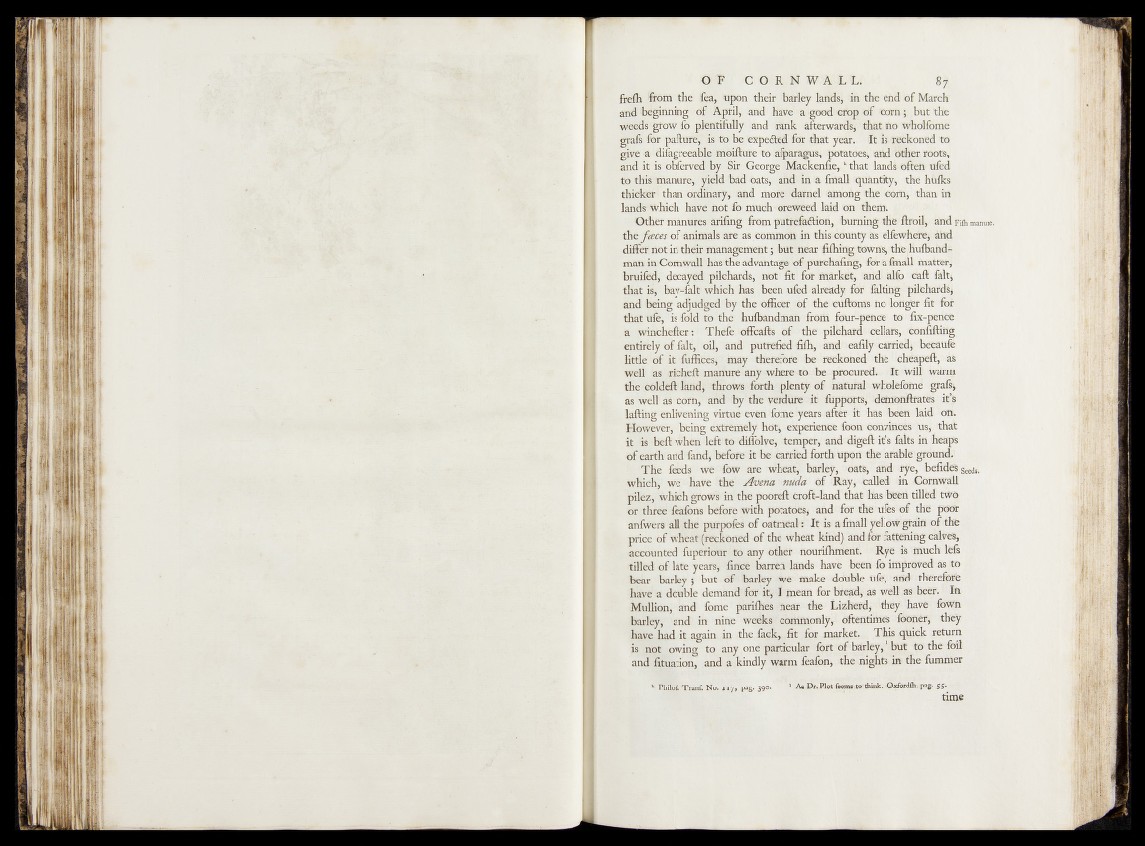
O $ O R N W A L L. 8 ?
frefli Item the Cea, ïapon their barley lands, in the end of Match
and ’beginning of April, and have a 'good erop of fedm; hut the
weeds kgtow fö E||ffiE0fia)Qy *&nd -tSnk ifterwaïdé, (iiat rto whcdfonife
grafe -rot paftüitÊy' is’^ be e xpen d fer that year, ft fe reckoned to
give a^difagteèabln MOift-efre to asparagus, potatoes* and other toots,
and it is obfervedi||’y aitHGeorge -Mackenfie,k that lands often ufed
to this?Manurey j^iêld bad oatsy ahd1 in a finall ^ükotltyy the hèlks
thicker thanfedMiaty, and more »da¥nei &®aoig the corn* than fil
lands Which have hot fo much-oreweed laid On theiri.
Other manures arifing from putrefetion, burning the ftfoil, and Fife manure,
the faces of animals are as conimoh in thisbounty Sis elfewhete* arid
differ riot in their management; but neat fiihing town’s, the hulbattd-
man in Gornwail has die advantage ^fpurchafing) fen finall matter*
bruifed, decayed pilchards, not fit f e Market, and alfo caff felt*
that is, bay-felt which has been tiffed already f e felting pilchard^
and being adjudged by the officer of the eüïtems hd! loilgef fit for
that üfe, is Ibid to thé hulbandinan frQfti four-pence to ftx-penen
a winchefter: Théfe offcaffs of the pilfeh^a tólMs, èonfifblïg^
entirely of lalt, oil, arid putffefied fifh, and eafily carried* becaufe
little W it fiiffifcésj inay therefore be reckoned the ehëapfeff, it
well as richfeft manure any •nhere-to be ptooured. It AVill warm
the coldeft land, throws feth plenty of natural whtilèfötne! gfafgj
as well aS cofh* and ‘by the verdure it fopports* demonftrates it’s
lafting enlivening vhtüé even leffle-ytars aftér it bas ’ bëèri Md o®.
However, being extremely hot* experience föoft ^nviöcêS usf that
it is bêft when left to diflblve, temper, and digeft it’s felts in heap’s
of earth add fend, before it be carried forth upon the arable ground.
! The feeds wfe fow are wheat, barley, oats* andtye, befid& seeds,
which, we- haVè thé Aüena Htida of dRay, nailed' in Gornwail
pilez, which grows ki the poOteft Croft-land that Ms bfeèri tilled tv^O
or three feafons before With potatoes* and for the ufès o# thé poor
anfwers all- the purpofes of oatmeal: It is a final! yelloW graifl of the
price of wheat (reckoned of die wheat land) and f e fatfedrig calves,
accounted fuperioUr to any Other noüriflirfiènt. Ryë fe touch left
tilled of late years) fiftcé barren lands have been foitoprOved as to
bear barley j but óf barley we-ifi&kè dóöMe ■ fifes* arid therefeé
have a double demand for it,-1 mean for bread, as well as beer. to
Mullion, and forrie parities near die Lizherd* - fhfey 'have fown
barley, and in nine wééks 'cototoorily, é^téfiritoéS foonér* they
have had it again in the feck, .fit .for market. This quick return
is not owing to any one particular fort of barley,1 but to the foil
and fituation, and a kindly warm feafon, the nights in fhe fenamer
* Philöf. Tranf. Noi jtfe pag. 390*'' 1 Aa Ör.Plot feema ttf thiök. OxÖidflu pag. fs« i"f
time